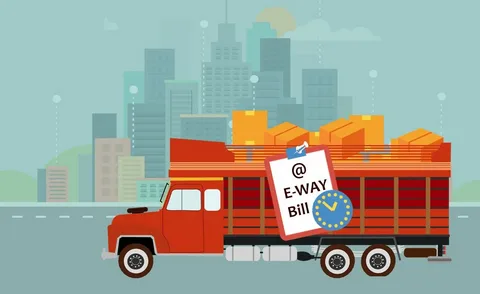An Eway bill, or Electronic Way Bill, is a mandatory document that outlines the movement of goods valued at more than INR 50,000. Introduced under the Goods and Services Tax (GST) regime in India, it is essential for both inter-state and intra-state transportation of goods. While generating an Eway bill can be confusing for businesses unfamiliar with digital systems, this article will simplify the process, focusing on Eway bill login and the steps involved in generating an Eway bill.
To generate an Eway bill, you must be a registered user on the Eway bill system portal. The first step involves Eway Bill login, where you enter your username, password, and a captcha code for verification.
Step-by-Step Guide to Easily Generate an Eway Bill
-
Eway Bill Login:
– Visit the Eway Bill system portal from your web browser.
– Click on ‘Login’ and enter your credentials. If you are a new user, you must first register on the GST portal to get your GSTIN (GST Identification Number).
-
Generating a New Eway Bill:
– After logging in, click on ‘Generate New’ from the Eway Bill dropdown menu. This will lead you to a form where you need to fill in the required information.
-
Selecting the Transaction Type:
– Choose ‘Outward’ if you are the supplier or ‘Inward’ if you are the recipient. You will then need to choose the sub-type of the transaction, such as ‘Supply,’ ‘Export/Import,’ ‘Job Work,’ ‘SKD/CKD,’ ‘Recipient not known,’ ‘Line Sales,’ ‘Sales Return,’ ‘Exhibition or fairs,’ or ‘For own use.’
-
Document Type Entry:
– Select the type of document, such as ‘Invoice,’ ‘Bill,’ or ‘Challan.’
– Enter the document or invoice number and date.
-
Product Details Entry:
– Provide detailed information about the goods, including name/description, HSN code (Harmonized System of Nomenclature), quantity, unit, total value, and GST rate.
– The system will automatically calculate and display the taxable value and total IGST, CGST, SGST and CESS amounts.
-
Transporter Details:
– Enter the transporter name, ID, and vehicle number. If transporting by road, mention the vehicle number. For rail, air, or ship transport, the transporter ID is mandatory.
-
Generate Eway Bill:
– After filling in all necessary details, click on the ‘Submit’ button. The system will generate your Eway bill, complete with a unique Eway Bill Number (EBN).
Tips for a Seamless Eway Bill Generation Process
- GST Registration: Ensure that you have valid GST registration, as the GSTIN is crucial for generating an Eway bill.
- Timely Generation: The Eway bill must be generated before the commencement of goods movement and can be cancelled within 24 hours of creation if needed.
- Correct Details: Double-check all entered details to avoid errors that could result in penalties or delays.
- Vehicle Number: Ensure the vehicle number is accurate and updated in case of road transport.
- Distance: Mention the approximate distance accurately between the supplier and recipient locations.
- Consignment Value: Make sure the total consignment value exceeds INR 50,000, as the Eway bill is mandatory for such consignments.
- Part A and Part B: Fill both parts of the Eway bill form accurately. Part A covers invoice details, while Part B includes transporter details.
Additional Features and Benefits of the Eway Bill System
- Validity: Eway bills have a specific validity period depending on the distance to be covered. For distances up to 100 km, the validity is one day, with an additional day for every 100 km thereafter.
- Multiple Vehicles: If goods are transferred using multiple vehicles, the Eway bill can be updated with the new vehicle details during transit.
- Consolidated Eway Bills: Multiple consignments can be combined into a single consolidated Eway bill for ease of transport.
- SMS Facility: Eway bills can also be generated, updated, or cancelled via SMS for convenience, especially in areas with limited internet access.
- Mobile App: A mobile app is available for generating Eway bills, making the process even more accessible for businesses on the go.
- API Integration: Businesses can integrate their ERP systems with the Eway bill system through API integration for seamless and automated bill generation.
Importance of Eway Bills in Business Operations
Generating an Eway bill is crucial for legal compliance and smooth business operations in India. It ensures that goods are transported legally, reducing the risk of penalties and delays. Additionally, Eway bills enhance transparency and trust in business transactions, providing a verifiable record of goods movement.
The GST regime, while simplifying tax administration, requires businesses to adapt to new procedures like Eway bill generation. Understanding the importance of the Eway bill login, how to fill out the form correctly, and ensuring timely generation can save businesses time and prevent legal complications. Though initially technical, regular use will make the process straightforward.
Conclusion
Generating an Eway bill is a vital aspect of running a business in India. The more familiar you become with the Eway bill generation process, the smoother your business operations will be. While it may seem daunting at first, understanding the steps and practising regularly can make it a simple task. Embracing the Eway bill system not only helps you comply with the law but also enhances the efficiency and credibility of your operations.
By following this guide, you can navigate the Eway bill system with ease, ensuring your business adheres to GST regulations and operates smoothly. Investing time in understanding this process will pay off by streamlining your logistics and fostering trust with your trade partners.
